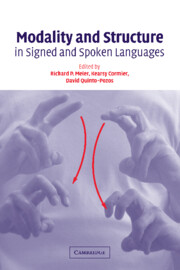Book contents
- Frontmatter
- Contents
- List of figures
- List of tables
- List of contributors
- Acknowledgements
- 1 Why different, why the same? Explaining effects and non-effects of modality upon linguistic structure in sign and speech
- Part I Phonological structure in signed languages
- Part II Gesture and iconicity in sign and speech
- Part III Syntax in sign: Few or no effects of modality
- Part IV Using space and describing space: Pronouns, classifiers, and verb agreement
- Index
Part II - Gesture and iconicity in sign and speech
Published online by Cambridge University Press: 22 September 2009
- Frontmatter
- Contents
- List of figures
- List of tables
- List of contributors
- Acknowledgements
- 1 Why different, why the same? Explaining effects and non-effects of modality upon linguistic structure in sign and speech
- Part I Phonological structure in signed languages
- Part II Gesture and iconicity in sign and speech
- Part III Syntax in sign: Few or no effects of modality
- Part IV Using space and describing space: Pronouns, classifiers, and verb agreement
- Index
Summary
The term “gesture” is used to denote various human actions. This is even true among linguists and psychologists, who for the past two decades or more have highlighted the importance of gestures of various sorts and their significant role in language production and reception. Some writers have defined gestures as the movements of the hands and arms that accompany speech. Others refer to the articulatory movements of speech as vocal gestures and those of signed languages as manual gestures. For those who work in signed languages, the term nonmanual gesture usually refers to facial expressions, head and torso movements, and eye gaze, all of which are vital parts of signed messages. In the study of child language acquisition, some authors have referred to an infant's reaches, points, and waves as prelinguistic gesture.
In Part II we introduce two works that highlight the importance of the study of gesture and one that addresses iconicity (a closely related topic). We also briefly summarize some of the various ways in which gesture has been defined and investigated over the last decade. A few pages of introductory text are not enough to review all the issues that have arisen – especially within the last few years – concerning gesture and iconicity and their role in language, but this introduction is intended to give the reader an idea of the breadth and complexity of these topics.
Information
- Type
- Chapter
- Information
- Modality and Structure in Signed and Spoken Languages , pp. 167 - 174Publisher: Cambridge University PressPrint publication year: 2002
Accessibility standard: Unknown
Why this information is here
This section outlines the accessibility features of this content - including support for screen readers, full keyboard navigation and high-contrast display options. This may not be relevant for you.Accessibility Information
- 1
- Cited by
